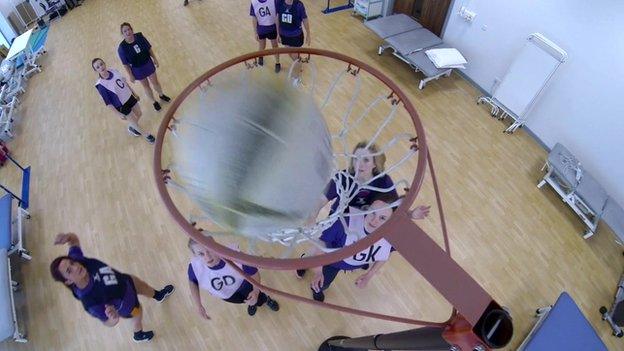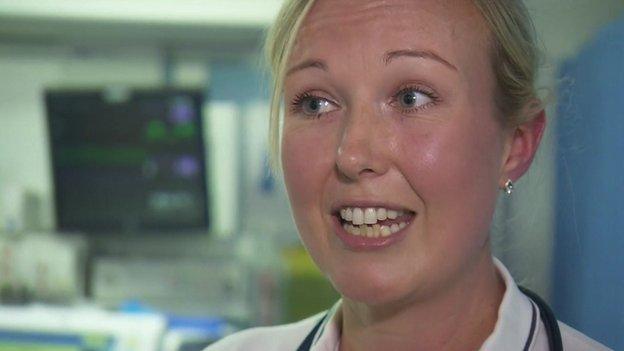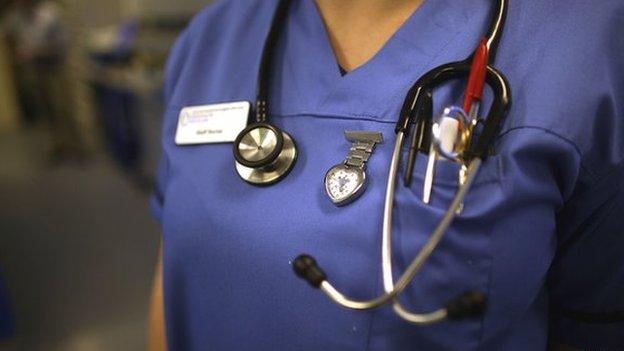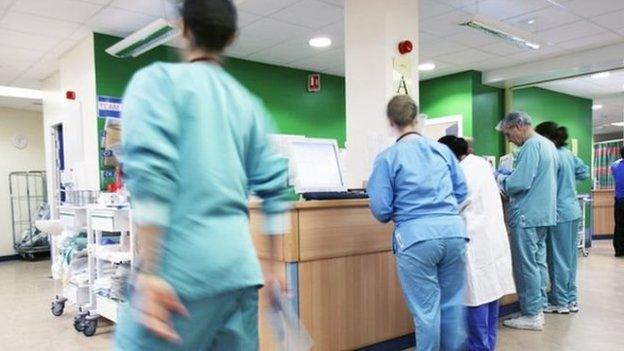Exercise classes help cut NHS staff sickness rates
- Published

Netball is just one of the activities that staff at the Walton Centre can take part in
Five years ago, Liverpool's Walton Centre, a specialist NHS hospital treating injuries to the brain, spine and nervous system, had a problem.
Too many of its staff were themselves falling sick.
It's an issue common to the rest of the NHS in the UK, where staff sickness rates have been much higher than in the rest of the economy.
Today the situation at the Walton Centre is much improved - so how have they done it?
The hospital's Intensive Therapy Unit (ITU) is where some of the sickest patients are cared for.
They are people such as Frances, who just a few weeks ago was leading a normal life until she fell victim to a devastating stroke.
Taking a toll
Helping her recovery is physiotherapist Katy Walker, who gently encourages Frances through a series of exercises.
Physiotherapist Katy Walker talks about how playing netball with her colleagues helps her in her work
As she explains, the job can take its toll, both physically and mentally.
"These patients are quite dependent, they've lost a lot of muscle tone in the time they've been sedated and ventilated on the ITU, so getting them up can be quite physically demanding.
"But it's also mentally demanding; obviously you gain a rapport with your patients and so you progress with them and if they have setbacks it can be quite stressful for you as well."
A short while later, Katy can be found in one of the hospital's rehabilitation gyms.
But it's not work that brings her here - well, not exactly.
Exercise as therapy
Equipment and chairs have been moved to the side of the room and a group of enthusiastic women carry out complicated netball drills, moving the ball up and down, passing and shooting.
It looks like a tiring session, particularly as they are having to repeat drills for our TV camera, but there is much laughter and chat.
For Katy, it is an essential part of her working week.

Physiotherapist Katy Walker says her job takes its toll physically and mentally
"Keeping fit and exercising, I think it helps you to eat healthily, just to be physically healthy, mentally healthy.
"So that definitely contributes to a healthy lifestyle and cutting sickness rates."
The netball team was set up a couple of years ago as part of the hospital's response to the high level of staff sickness.
With a workforce of around 1,300, sickness rates were running at an average of more than 7% a year.
At times, that figure could be much higher, for example during an outbreak of winter flu.
Sickness costs money
Sickness rates matter because they reflect the health and wellbeing of staff who, in turn, are expected to care for their patients.
But as chief executive Chris Harrop explains, high rates of sickness also have a financial implication.
"You have to run a service, so you have to backfill, quite often you're using very expensive methods to do that.
"Traditionally we've used a lot of agency staff, for medics we use locums, and obviously that comes with a cost.
"It's also the impact on other colleagues as well, so to sustain that level of sickness it has a significant impact on the people who are left on the front lines."
So managers and unions decided something needed to be done and the idea of activity and exercise classes took off.
Now, as well as netball, there is a staff football team, a running club, Pilates classes, massage and aromatherapy, weight management programmes and a host of other schemes and activities.
All are designed to increase physical activity, relieve stress and improve the health and wellbeing - physical and mental - of staff.

Sick note culture?
According to the Health & Social Care Information Centre, external in the year 2013-14, health service workers in England took an average of 14.82 sick days.
That was an improvement on 2012-13, when the figure was 15.52 days.
But data from the Office for National Statistics, external shows that in 2013, across the whole UK labour force, just 4.4 days per worker were lost to sickness.

The Walton Centre's success has been reflected in a string of workplace awards.
And that figure of 7% sickness from 2010 is now just around 4%, on a par with the rest of the NHS in England.
Physician, heal thyself
Mike Gibney, the Walton Centre's director of workforce, says the NHS presents a unique combination of physical and mental stress.
But he believes looking after staff wellbeing also helps improve the quality of care for patients.
"Hospitals run on goodwill. Everybody does over their allotted number of hours.
"So it just helps with building that good culture; staff feeling valued so they can value patients."
A healthy workforce means better care for patients and offers the chance to save money on staff costs.
Those are two key goals for the NHS and staff at the Walton Centre believe they are leading the way.

Does your workplace encourage wellbeing and fitness? You can share your comments by emailing haveyoursay@bbc.co.uk, external.
Please include a contact number if you are willing to speak to a BBC journalist. You can also contact us in the following ways:
Whatsapp: +44 7525 900971
Tweet: @BBC_HaveYourSay, external
Send an SMS or MMS to 61124
- Published24 March 2015

- Published4 June 2015
